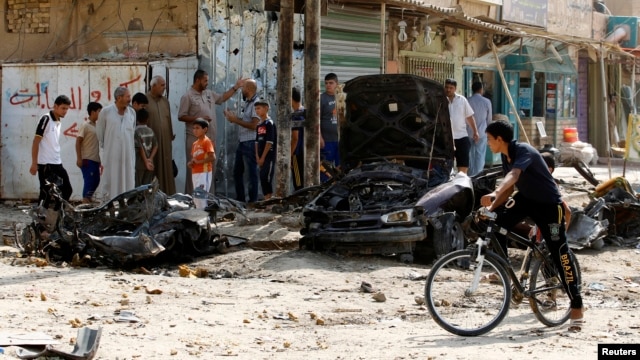Civilians gather at site of a car bombing in Baghdad's Husseiniya district, June 25, 2013.
Reuters
July 02, 2013
Nearly 50 Killed in Iraq Bombings
BAGHDAD — At least 45 people were killed in bomb attacks across Iraq on Tuesday, most of them in busy markets and commercial areas of the capital Baghdad, police and medics said.
The deadliest assault took place in the predominantly Shi'ite Shaab neighborhood of northern Baghdad, where two car bombs killed eight people. There were also explosions in the mainly Shi'ite districts of Abu Dsheer, Kamaliya, Tobchi and Shula.
"A blast hit near a crowded market full of people shopping," said Ali Sadoun, a policeman whose patrol was stationed in Shula. "When police and people gathered to help the wounded, a second bomb went off, tearing through bodies."
Sunni Muslims were the apparent targets of blasts in Amriya and Abu Ghraib, on the city's western outskirts.
A sustained campaign of attacks since the start of the year has increased fears of wider conflict in a country where ethnic Kurds, Shi'ite and Sunni Muslims have yet to find a stable power-sharing compromise.
Insurgents including al Qaeda's Iraqi affiliate have been recruiting from the country's Sunni minority, which resents Shi'ite domination since the U.S.-led invasion that toppled Saddam Hussein in 2003.
Intercommunal tensions have been inflamed by the civil war in neighboring Syria, which is increasingly been fought along sectarian lines, drawing in Shi'ite and Sunni fighters from Iraq and elsewhere to fight on opposite sides of the conflict.
Outside Baghdad, a bomb blast near a funeral tent in the city of Baquba killed six people.
Further south, a car bomb in Amara province killed four people and in the city of Basra, three blasts hit a hotel frequented by foreigners working in the oil industry, wounding three guards.
Violence is still well below its height in 2006-07, but Sunni insurgents are striking on a daily basis, seeking to destabilize the Shi'ite-led government and provoke further confrontation.
On Monday, attacks targeting Shi'ites left at least 27 people dead. The number of people killed in militant attacks across Iraq in June reached 761.
Iraqi military forces are now better equipped and trained, but lack the comprehensive intelligence resources and air cover to track insurgents that they enjoyed before U.S. troops withdrew in December 2011.
The deadliest assault took place in the predominantly Shi'ite Shaab neighborhood of northern Baghdad, where two car bombs killed eight people. There were also explosions in the mainly Shi'ite districts of Abu Dsheer, Kamaliya, Tobchi and Shula.
"A blast hit near a crowded market full of people shopping," said Ali Sadoun, a policeman whose patrol was stationed in Shula. "When police and people gathered to help the wounded, a second bomb went off, tearing through bodies."
Sunni Muslims were the apparent targets of blasts in Amriya and Abu Ghraib, on the city's western outskirts.
A sustained campaign of attacks since the start of the year has increased fears of wider conflict in a country where ethnic Kurds, Shi'ite and Sunni Muslims have yet to find a stable power-sharing compromise.
Insurgents including al Qaeda's Iraqi affiliate have been recruiting from the country's Sunni minority, which resents Shi'ite domination since the U.S.-led invasion that toppled Saddam Hussein in 2003.
Intercommunal tensions have been inflamed by the civil war in neighboring Syria, which is increasingly been fought along sectarian lines, drawing in Shi'ite and Sunni fighters from Iraq and elsewhere to fight on opposite sides of the conflict.
Outside Baghdad, a bomb blast near a funeral tent in the city of Baquba killed six people.
Further south, a car bomb in Amara province killed four people and in the city of Basra, three blasts hit a hotel frequented by foreigners working in the oil industry, wounding three guards.
Violence is still well below its height in 2006-07, but Sunni insurgents are striking on a daily basis, seeking to destabilize the Shi'ite-led government and provoke further confrontation.
On Monday, attacks targeting Shi'ites left at least 27 people dead. The number of people killed in militant attacks across Iraq in June reached 761.
Iraqi military forces are now better equipped and trained, but lack the comprehensive intelligence resources and air cover to track insurgents that they enjoyed before U.S. troops withdrew in December 2011.
***
|
| 2013-07-01 |
BAGHDAD, July 1 (Xinhua) -- The death toll among Iraqis from violence in June declined to 761 compared to May, the United Nations said on Monday.
554 civilians and 207 security troops were killed and 1,771 others were wounded, including 1,389 civilians and 382 security personnel, in terrorist and violent acts in June, a statement by the UN Assistance Mission for Iraq (UNAMI) showed on Monday.
The Iraqi capital of Baghdad is the worst-affected province with 950 civilian casualties (258 killed, 692 injured), followed respectively by Salahuddin, Nineveh, Diyala, Anbar, Kirkuk, Babil, Wasit Basra and Najaf, the statement said.
In May, 1,045 Iraqis were killed and 2,397 were wounded, which by then was the highest toll since 2008.
Tensions and violence have been escalating between the Sunni and Shiite communities since late December 2012, when the Sunni Muslims started their protests against the Shiite-led government in six of Iraq's predominantly Sunni provinces and the Sunni districts in Baghdad.
The Sunnis accuse the government of marginalizing them, and claim that the Shiite-dominated Iraqi security forces were indiscriminately arresting and torturing their sons.
However, the deadliest waves of violence began after April 23, when Iraqi security forces backed by helicopters stormed an anti- government Sunni protest in the city of Hawijah, some 220 km north of the Iraqi capital of Baghdad, killing and wounding dozens of protestors.
The military operation against the sit-in camp in Hawijah sparked further clashes across the country's Sunni-dominated provinces between the Sunni tribes and the security forces.


No comments:
Post a Comment